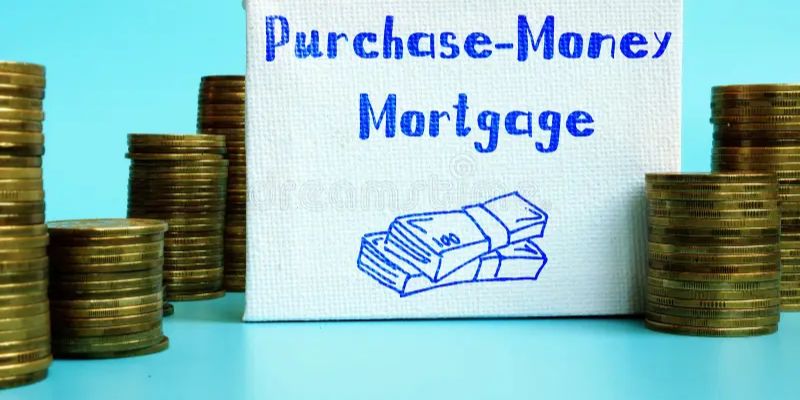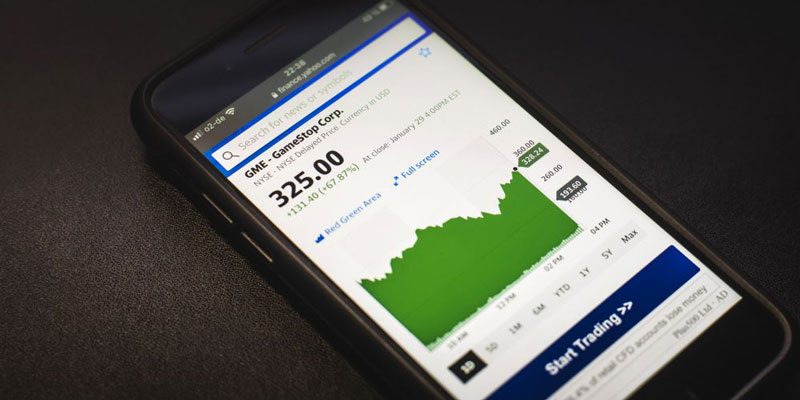What is a Purchase Money Mortgage
Nov 08, 2023 By Susan Kelly
Are you looking to purchase a home but need more funds saved up? If so a purchase money mortgage is the solution you need. A purchase money mortgage is an alternative form of financing that can help you get the house of your dreams without draining your savings.
In this blog post we will discuss what a Purchase Money Mortgage is and how it works for people to make informed decisions about their home-buying journey. So if you're ready to learn more about one of today's most popular forms of financial assistance keep reading!
What Is a Purchase-Money Mortgage

A purchase-money mortgage, also known as a PMM, is a type of loan used to finance the purchase of real estate. This type of financing typically involves putting down a small amount of money upfront and borrowing the remaining balance from a lender or financial institution.
Though an associated interest rate can be attached to the loan, it is still much less than most other financing options.
How Does a Purchase-Money Mortgage Work

Both first-time and seasoned homebuyers can use this form of financing. The amount that can be borrowed depends on various factors such as credit score, income, down payment, and debt-to-income ratio.
Typically, the lender will give the borrower funds to cover the purchase price of the home and any associated costs, such as closing costs and fees. The loan is then secured by a lien on the property, which means that if the borrower defaults on their payments, they may be forced to surrender their home. Generally, interest rates for purchase money mortgages are slightly higher than other forms of financing.
Types of Purchase-Money Mortgages
There are various types of purchase-money mortgages, each with its characteristics and features. Here are some common types:
Conventional Purchase-Money Mortgage:
A conventional purchase-money mortgage is a loan offered by a private lender, such as a bank or credit union, without government backing.
Features:
- Typically requires a down payment, ranging from 5% to 20% of the purchase price.
- The interest rate and terms are based on the borrower's creditworthiness and market conditions.
- Private mortgage insurance (PMI) may be required if the down payment is less than 20%.
- Offers various repayment terms, such as 15 years or 30 years.
FHA Purchase-Money Mortgage:
The government insures an FHA (Federal Housing Administration) purchase-money mortgage through the FHA program.
Features
- Designed to help borrowers with lower credit scores or limited funds for a down payment.
- Requires a down payment as low as 3.5% of the purchase price.
- The interest rates may be higher than conventional loans.
- Mortgage insurance premium (MIP) is mandatory and may be paid upfront or included in the monthly payments.
VA Purchase-Money Mortgage:
A VA (Veterans Affairs) purchase-money mortgage is specifically available to eligible veterans, active-duty military personnel, and their spouses.
Features:
- Offered by private lenders but guaranteed by the Department of Veterans Affairs.
- Down payment is optional for most qualified borrowers.
- May have lower interest rates compared to conventional loans.
- No private mortgage insurance is required.
- A funding fee, a one-time fee paid at closing, is charged to offset the program's costs.
USDA Purchase-Money Mortgage:
A USDA (United States Department of Agriculture) purchase-money mortgage is designed for eligible rural and suburban homebuyers.
Features:
- Offered to low-to-moderate-income borrowers in designated USDA-eligible areas.
- No down payment is required.
- May have lower interest rates compared to conventional loans.
- Upfront and annual mortgage insurance premiums are required.
Seller Financing
Seller financing, also known as owner financing, occurs when the property's seller acts as the buyer's lender.
Features:
- The seller provides the financing, and the buyer makes regular payments directly to the seller.
- Terms are negotiated between the buyer and seller, including interest rates, repayment period, and down payment.
- It may be an option when traditional mortgage financing is challenging to obtain.
- Typically, a title transfer occurs once the buyer completes the loan payments.
Purchase-Money Mortgage Benefits for Buyers
Easier qualification
Buyers needing help qualifying for a traditional mortgage loan due to poor credit history or insufficient income may find it easier to obtain a purchase-money mortgage. Sellers may be more flexible in their lending criteria and more willing to work with buyers who don't meet the strict requirements of traditional lenders.
Simplified approval process
The approval process for a purchase-money mortgage is typically faster and less complex than for traditional mortgage loans. Since the seller provides the financing, they have more control over the approval decision and can expedite the process.
Lower closing costs
In some cases, purchase-money mortgages have lower closing costs than traditional mortgages. Buyers may save on loan origination fees, appraisal, and closing costs typically associated with third-party lenders.
Negotiable terms
Buyers and sellers have more flexibility in negotiating the mortgage terms. They can agree upon the interest rate, repayment period, and other conditions that suit both parties. This flexibility allows for more customized and potentially favorable loan terms than standard mortgage options.
Expanded property options
Purchase-money mortgages can open up a wider range of property options for buyers. Sellers who offer owner financing might be more willing to sell unique or unconventional properties that traditional lenders may consider risky or undesirable.
Potential for a lower down payment
While traditional mortgages often require a significant down payment, sellers providing purchase-money mortgages may be more flexible with the down payment amount. This flexibility can make homeownership more accessible for buyers with limited savings for a down payment.
Purchase-Money Mortgage Benefits for Sellers
Attracts More Buyers
Sellers can attract a larger pool of potential buyers by offering a purchase-money mortgage. This larger pool is particularly useful when the market is slow, or buyers need help obtaining traditional financing from banks or lending institutions.
Faster Sale
Sellers who provide financing through a purchase-money mortgage can often sell their property more quickly. Buyers can bypass the lengthy process of securing a loan from a traditional lender, resulting in a faster closing timeline.
Competitive Advantage
Offering seller financing can give sellers a competitive edge in a competitive real estate market. Buyers may prefer a purchase-money mortgage over other properties, not offering this financing option, increasing the likelihood of a successful sale.
Higher Sales Price
Sellers can negotiate a higher sales price when providing financing. Sellers can justify a higher purchase price and maximize profits by offering attractive loan terms, such as lower interest rates or flexible repayment options.
Steady Income Stream
Sellers who finance the purchase can enjoy a consistent income stream from the interest and principal payments made by the buyer. This consistent income stream can be particularly beneficial for sellers looking for a reliable source of passive income or who want to spread out the tax implications of a lump sum payment.
Flexible Terms
Sellers can negotiate customized terms and conditions that suit their needs. They can set the interest rate, repayment schedule, and other loan terms based on their preferences, financial goals, and the buyer's ability to pay.
Reduced Closing Costs
Sellers offering a purchase-money mortgage can save on certain closing costs typically associated with a traditional sale. For example, they may be able to avoid paying loan origination fees, appraisal fees, or other expenses incurred when a buyer obtains financing from a lender.
FAQs
What is an example of a purchase money mortgage?
An example of a purchase money mortgage is an FHA loan, which allows buyers to borrow up to 96.5% of the cost of the home from the seller without needing a down payment.
What is the purpose of purchase money mortgage?
The purpose of a purchase money mortgage is to provide buyers with an alternative form of financing when they do not have the necessary funds to pay for the house in cash. This type of loan allows them to buy their dream home without draining all their savings.
Are there any risks associated with purchase a money mortgage?
Yes, as with any loan, there are risks associated with purchase a money mortgage. The main risk is that the buyer may default on the loan, leaving the seller to cover their expenses and any outstanding debt the borrower owes.
Conclusion
A purchase money mortgage is an innovative and beneficial home loan option for buyers and sellers. Buyers benefit from gaining access to more competitive loan terms and payments based on their financial situation, while sellers benefit from having their property sold much faster with minimal hassle or risk. It's worth considering for those looking to buy a home without the extended wait times or uncertain results of traditional financing models.

Different Features of W-4 Form
Jan 09, 2024
Form W-4, the document that every employee is required to fill out to establish the amount of taxes that are withheld from each paycheck, had significant revisions in the year 2020.

A Comprehensive Overview of MarketBeat vs Seeking Alpha 2024
May 20, 2024
MarketBeat and Seeking Alpha offer stock ratings, analysis, and sophisticated screening tools. They modify their offerings to suit investors' needs.

Navigating Tow Truck Insurance: Factors, Selection, and Importance
Jan 30, 2024
This discusses the factors influencing tow truck insurance premiums, how to select the optimal coverage, and the importance of adequate insurance for towing enterprises.

Arvest Mortgage Review
Oct 10, 2023
Read our comprehensive Arvest mortgage review to learn what types of loan products the lender offers, its eligibility requirements, customer service ratings and more. See if Arvest is the right fit for your home financing goals.

What Is WebBank?
Oct 24, 2023
Although not everyone is eligible to use the cards that WebBank issues, the financial institution is reputable and risk-free to do business with.

Insight Into The Holding Company
Nov 03, 2023
Holding companies are corporations that do not participate in the manufacturing, wholesale trading, or retail selling of their products or services. A holding company's principal purpose is to accumulate ownership stakes in or membership in another firm, as the name suggests..

5/1 Hybrid ARM: Understanding Adjustable-Rate Mortgage Mechanics
Dec 25, 2023
Know the 5/1 Hybrid Adjustable-Rate Mortgage (5/1 Hybrid ARM). Discover the benefits and drawbacks of it. Click to read more.

Gross Exposure
Nov 14, 2023
Gross exposure is the fund's total exposure to financial markets. This includes long and short positions, leverage, and other exposures. Gross exposure is the amount of money the fund holds in the markets.

LegalZoom Alternatives To Save Money
Feb 21, 2024
Several alternatives better fulfill your requirements; nonetheless, the formation packages offered by LegalZoom are among the most costly options currently available.

Best Backtesting Software 2024 - Top 4 Options For Beginners
May 20, 2024
Maximize your trading potential with the best backtesting software of 2024 and empower yourself with strategic insights for profitable trading.

A Beginner's Step by Step Guide on Trading Future in 2024
May 20, 2024
Future financial trading involves buying and selling financial or commodity contracts. Risk management, market tracking, and hedging are must-learns.

Understanding Trial Balance: Definition, Function, and Importance
May 19, 2024
Explore trial balance - its definition, operation, and purpose. Acquire the knowledge needed to manage your financial records effectively.